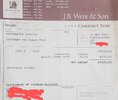- Joined
- 3 July 2009
- Posts
- 27,638
- Reactions
- 24,526
Yep, Office works doesn't work in the same space as Coles, it is more of a white collar Bunnings.yes i agree Office-Works is doing very well , and i believe owns some of the property where outlets are situated , however the fate of Office-Works has been discussed several times the WES discussions on the future of WES ( at management level )
why divest , well WES divested COL , maybe management can increase shareholder value by setting it free ( or at least a separate property trust ) i would prefer the property trust scenario , but let's see if anything happens at all
( it wasn't that long back WES divested it's coal interests , which were nicely profitable )
Picked up Franked Income Fund a long time ago, they were absorbed into WES, then picked up more after the GFC when I retired and hold with div reinvestment.
Never had a good reason to sell WES yet.
The paperwork will be horrific if I ever do. Lol

